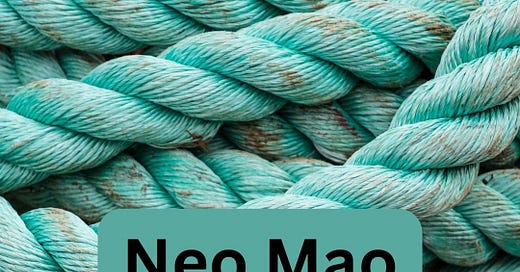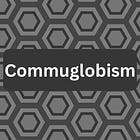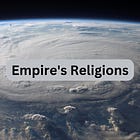“Never attempt to cure that which you do not understand.”
Woke is Marxism evolved to take on the West. – James Lindsay
I’ve followed James Lindsay’s work, almost from the beginning, and I’m very glad it’s receiving the attention and credit it deserves.
I think his short March 2023 speech is worth highlighting and reflecting on, and that it has historical significance. I’d like to come back to this article in 10 years and see what I think about it (assuming Substack didn’t sell out).
On March 29, 2023, James Lindsay delivered a short address before a conference at the European Union Parliament in Brussels, Belgium. This speech has been widely recognized as making the nature of the Neo-Marxist Cultural Revolution engulfing the West extremely clear, with a sharp warning to Europe not to follow in the footsteps of the Anglophone countries. In the two months since, this speech has gone viral and received incredible praise and feedback for its clarity and ability to articulate the true nature of the so-called "culture war" or "Woke" phenomenon threatening the West.
I have watched this speech multiple times, and I’m happy describing it as the best summary of a very broad range of very deep and complex ideas that Lindsay has masterfully summarized and synthesized.
The speech is about 30 minutes (28 to be precise) so here are 30 key points and take aways from this masterpiece.
Marxism and the Means of Production: Marx's thesis was that to bring socialism to the world, we must seize the means of production.
Economic Marxism: Marx believed that economic activity was the key activity of man, and that economic production doesn't just produce goods and services, but also society itself, which in turn produces man.
Marx as a Theologian: Marx wanted to produce a religion for mankind that would supersede all other religions and bring him back to his true social nature.
Special Form of Property: Marx proposed that economics becomes a vehicle to separate society into a bourgeois class that has access to a special form of property, and the proletariat who are excluded from this property through exploitation, alienation, estrangement, and oppression.
The Evolution of Marxism: Lindsay discusses how Marxism has evolved over time to adapt to different societies and cultures, from economic Marxism to cultural Marxism, and now to what he refers to as "woke" Marxism.
Cultural Marxism: This evolved form of Marxism proposes that we must enter the cultural institutions to change them from within because Western culture has something about it that's repelling socialism.
The Role of the Frankfurt School: Lindsay discusses the role of the Frankfurt School in developing the concept of "critical Marxism" and "critical theory", which criticizes the entirety of existing society.
The Abandonment of the Working Class: Lindsay discusses how modern forms of Marxism have moved away from focusing on the working class as the base of the revolution, instead focusing on racial, sexual, and gender minorities.
The Culture Industry: Lindsay discusses the concept of the "culture industry", which commodifies and packages culture, and how Marxists have seized control of this industry to promote their ideologies.
Critical Race Theory: This theory falls under the same genus as Marxism, but with race replacing class. It proposes that whiteness or white privilege constitutes a kind of cultural private property that must be abolished for racial justice.
Queer Theory: This theory also falls under the same genus as Marxism, but with the concept of "normal" replacing class. It proposes that those who get to set the norms of society are privileged, and those who are considered abnormal are oppressed.
Post-Colonial Theory: This theory proposes that the West, having colonized the world and brought its culture to it, is the oppressor, and the natives around the world are the oppressed who must decolonize their societies.
The Use of Identity Politics: Lindsay discusses how identity politics have been used as a tool to promote Marxist ideologies, creating divisions and promoting the idea of oppressed and oppressor groups.
The Influence of Mao Zedong: Lindsay discusses the influence of Mao Zedong's strategies, particularly his use of identity politics and his "Unity, Criticism, Unity" strategy, on modern Marxist ideologies.
Maoist Cultural Revolution: Lindsay argues that the current "woke" movement is advancing through Maoist cultural revolution techniques, using Americanized identity categories.
The Role of Education: Lindsay suggests that education systems, particularly in America, have been influenced by these Marxist ideologies, leading to a lack of understanding about the true nature of communism and Marxism.
Western Marxism: This is a form of Marxism that has evolved to attack the West at its weakest points through our tolerance, acceptance, openness, and generosity.
Democratic Centralism: This is what Mao called the way that the new socialist standard would work. Itis also known as stakeholder capitalism.
Inclusion and Sustainability: These are the new socialist standards under which we will supposedly have freedom.
The Concept of "Global Citizenship": Lindsay criticizes the concept of "global citizenship", arguing that it is a way to promote the United Nations' sustainable development goals and to shift focus away from individual rights towards global responsibilities.
Global Citizens: The goal of the "woke" movement is to make us into global citizens who support the 17 sustainable development goals of the United Nations Agenda 2030.
The Danger of Overreaction: Lindsay warns of the danger of overreacting to provocations from Marxists, as this can be weaponized and used to further their cause.
Middle-Level Violence: Marx's strategy is always of the same type, middle-level violence. They provoke, and if you give in or overreact, they weaponize your reaction.
Understanding the Enemy: To fight back against the "woke" movement, we must understand that it is Marxism evolved to take on the West.
Naming the Enemy: Lindsay concludes by naming the enemy as "woke" Marxism, evolved to take on the West.
The Threat to Western Civilization: Lindsay argues that "woke" Marxism poses a significant threat to Western civilization, and that understanding and recognizing this threat is crucial to combating it.
Cultural Revolution in Europe: Lindsay warns that Europe is at great risk of a cultural revolution similar to the one in China.
China as the Future: If we don't stop the "woke" movement, our future will look like China, with its social credit system and oppression.
The Influence of the World Economic Forum and the United Nations: Lindsay criticizes these organizations for coordinating the promotion of "woke" Marxism.
The Need to Fight Back: Lindsay emphasizes the need to fight back against "woke" Marxism to preserve Western civilization.
This article and Lindsay’s speech is a compendium to my previous article on The Great Awakening documentary.
I think they are connected pieces of work (his speech and the documentary) and can be viewed in either sequence.
Lindsay makes the brilliant point about Genus and Species, the first person I have heard create that mental model of understanding what is going on.
For example, Canis is a Genus, that has the following Species within it:
· Gray wolf (Canis lupus)
· Domestic dog (Canis lupus familiaris)
· Coyote (Canis latrans)
· Golden jackal (Canis aureus)
· Ethiopian wolf (Canis simensis)
And so, Lindsay outlines that Marxism is the Genus that has these Species:
· Classical economic Marxism
· Radical feminism
· Critical race theory
· Queer theory
· Post colonial theory
I think he has put his finger on just the right articulation of the point. It’s very helpful.
Intersectionality binds and “braids” these threads together into a rope that aims to hang Western civilization.
Intersectionality is a theoretical framework for understanding how aspects of a person's social and political identities (e.g., gender, race, class, sexuality, disability, etc.) combine to create unique modes of discrimination and privilege. The term was first coined by Kimberlé Crenshaw, a legal scholar, in 1989, and it's widely used in social sciences and critical theories, especially in feminist theories.
This is a good discussion that Lindsay had with Peterson recently.
It could have been far better but for Jordan’s incessant interruptions, but nevertheless, there is enough from Lindsay to make it a worthwhile discussion. I extracted a section for the masthead clip, where you can see that Lindsay unambiguously understands that there is a “they” and they have chosen to pour the gasoline (money) and create a wildfire with these noxious ideologies. Peterson’s continued naivety on this subject frustrates me, as much as I like and respect the man.
Denis Rancourt understands who the “they” are better than anyone I think, as outlined in his 2019 masterpiece study of the subject.
Summarized here:
Lindsay makes the important point that what Marxists mean when they use the word “Property” is not what we think that word means.
Where Marx & Engels said:
"In this sense, the theory of the Communists may be summed up in the single sentence: Abolition of private property."
Lindsay explains how Marxists think of “Property” and refers to Cheryl Harris who in 2006 wrote “Whiteness as property”.
The thesis of the paper can be summarized as such:
Harris argues that "whiteness" in America has been treated like a form of property. This started during the times of slavery and Native American conquest and gave white people certain societal benefits. Despite legal changes, this idea still exists and impacts things like racial identity and affirmative action. To fix this, Harris suggests we need to acknowledge and address how being white is still seen as having certain advantages.
There’s a point in his speech where Lindsay says that Marxism and all its Species “channel resentment”. Yes indeed!
This reminds me of the Cain and Abel story, addressed here:
One way to understand this story, at least for me, is that the brothers are representations of the two spirits that swirl the world, that swirl inside us. They are there in every moment (remember The Mandorla from yesterday).
The spirits of Gratitude (Abel) and Resentment (Cain).
Lindsay goes on you explain how “Normal” is a form of “Capital” and what Queer Theory has to say about “abolishing” that.
Here refers to David Halperin and his book Saint Foucault: Towards a Gay Hagiography
What the hell is “hagiography”?
A hagiography is a biography that portrays its subject in an overly positive or idealized manner. Originally, the term was used to refer to the writing of the lives of saints and venerating them. In modern usage, it has expanded to refer to any biography that overly praises or flatters its subject, regardless of whether the subject is religious or secular. So, when David M. Halperin titled his book "Saint Foucault: Towards a Gay Hagiography," he was indicating a strongly positive and perhaps idealized portrayal of philosopher Michel Foucault's impact on the study of sexuality.
The book can be summarized as such:
1. The book celebrates Michel Foucault, a philosopher, as a hero for gay and queer studies. His ideas have helped us better understand issues about sexuality and power.
2. Foucault believed that power and knowledge are linked. Society uses what it 'knows' about sexuality to control and categorize people. Halperin discusses this idea in the context of gay rights.
3. Foucault proposed that our understanding of sexuality isn't just based on biology. Instead, society's beliefs and norms play a big role in defining it.
4. Foucault also suggested that people should create their own ideas about what's right or wrong in their sexual behavior, rather than just following what society says.
5. Halperin's book ends with a call to keep using Foucault's ideas to challenge and change the way society views sexuality and power.
Any of this sound familiar?
Before we move on from Foucault, it’s always good to remember this:
A dystopian Peter Pan - by Toby Rogers - uTobian (substack.com)
The intellectual guiding light of progressivism at the moment, Michel Foucault (1926–1984), also had trouble understanding the difference between adults and children and likely was a pedophile. Foucault’s genius is celebrated by left social scientists while his sexual abuse of boys in Tunisia is overlooked. Why? Could Foucault’s interest in pederasty have shaped his philosophy that sought to erase heretofore existing categories in society?
This idea of “Whiteness” as Property, and “Normal” as Property is a real insight that Lindsay gives us. It’s a key to unlock a whole variety of observations in this new world we live in.
It has helped me improve my thinking on vaccination generally but childhood vaccination specifically.
Why is the “left” so in love with vaccination generally and childhood vaccination specifically? Why would there be a political aspect to what otherwise seems to be a medical question? I’m going to propose that “Health” is another form of Marxist “property”.
Health could be interpreted as a form of 'individual capital' or 'biological capital,' contributing to a person's ability to work and produce value. In this sense, good health could enhance a person's ability to generate economic capital, while poor health could inhibit it. Additionally, health, like other forms of capital, is unevenly distributed across society, often correlating with socioeconomic status and other forms of economic and social capital.
That childhood vaccination serves as a redistributive mechanism of biological capital - a conceptual form of capital encompassing health and wellness. While biological capital isn't traditionally discussed within Marxist theory, expanding our definition allows us to better understand and critique the role of healthcare within capitalist structures. By ensuring equal access to vaccines, societies can promote more equitable distribution of health and opportunity, thus potentially disrupting patterns of social and economic inequality.
Lindsay mentions Herbert Marcuse a few times. Here is one of Linday’s great short clips.
Summarized:
Herbert Marcuse's Influence: Marcuse, a Marxist thinker from the 20th century, had a significant influence on society. His ideas have shaped many aspects of the current societal landscape, including the concept of "Repressive Tolerance," the shift towards Identity Marxism, and the push for "sustainability" at the highest levels of global governance.
Repressive Tolerance: This concept, proposed by Marcuse, argues that tolerance in free societies is designed to be repressive. He suggests that tolerance should be withdrawn from right-wing ideas and extended to left-wing ideas, even when they are violent. This concept explains the suppression of certain ideas on social media and mass media.
Shift to Identity Marxism: Marcuse's work also led to a shift from economic class to identity politics. He suggested that the working class had failed Marxist revolutionaries and that revolutionary energy should be found elsewhere, such as among racial minorities, sexual minorities, feminists, and students.
Sexual Liberation: Marcuse's work "Eros and Civilization" advocates for the release of sexual energy to fuel social revolution. This idea has influenced the ongoing push for sexual liberation in society.
Sustainability: Marcuse's work "One Dimensional Man" discusses the need for a new sustainable model for the economy. This idea has influenced current discussions about sustainability and the so-called "circular economy."
Lindsay refers to Mao’s “identities” in his speech, that he also explains here in more detail:
Summarized:
Maoist Education: Lindsay, James Lindsay, argues that schools in North America are reproducing a youth radicalization program similar to the one used by Mao Zedong. This program uses Critical Race Theory, Gender Theory, Queer Theory, and other Critical Theories of Identity to create politically active, radical, and revolutionary personal identities among students.
Mao's Red Guard: Lindsay draws parallels between Mao's Red Guard, a group of radicalized youth who were used to enforce Mao's Cultural Revolution, and what he sees as a similar radicalization of youth in Western schools today. He suggests that these students are being encouraged to reject traditional culture and values, much like the Red Guard were.
Identity Marxism and Maoism: Lindsay suggests that the application of identity-based Marxism in schools is leading to a form of Maoism. He argues that students are being divided into "good" and "bad" identities, with the "good" identities being those that align with the ideologies of Critical Race Theory, Queer Theory, etc. This, he suggests, is similar to Mao's division of people into "red" (good) and "black" (bad) identities.
The Role of Schools: Lindsay argues that schools are playing a key role in this process by creating social pressure for students to shift from "bad" identities to "good" ones. He suggests that this is being facilitated through programs like social emotional learning, ethnic studies, and culturally responsive teaching.
The Impact: Lindsay suggests that this process is leading to a cultural revolution similar to Mao's Cultural Revolution in China. He argues that it is resulting in the tearing down of traditional culture and values, the shaming and rejection of parents and older generations, and the creation of a group of radicalized youth ready to act as agents of change.
Australia is currently in the grips of its own Neo Maoist moment, with The Voice and the attempt to change the national constitution.
There should be now doubt at all that The Voice is the latest Australian “variant” of the Marxist virus.
Australia’s Albanese Labor government is attempting to rig a referendum that would create a racially-based constitutional body, compromising the nation's sovereignty and democracy, all under the guise of benefiting Aboriginal Australians.
This deceptive move uses a ‘victim class’ as a means for globalist oligarchs to gain control over Australia’s land, waterways, and natural resources, similar to how totalitarians have historically manipulated the masses for their own gain.
A UN document details a plot to use ‘indigenous rights’ as a front for a globalist takeover of Australia's land and resources, with 70-80% of the nation’s landmass expected to be under non-transferable native title by 2030.
Former Communist Party of Australia member turned whistle-blower, Geoff McDonald, warned in the 1980s about the Marxist strategy to infiltrate the ‘indigenous rights’ agenda and establish a separate Aboriginal nation under Communist domination.
If enacted, the ‘Voice’ would likely result in the appropriation of 70% of Australian land to native title, not benefiting Aboriginal people but providing opportunities for global oligarchs to exploit the country’s resources.
Comparing the situation to New Zealand’s ‘co-governance’ model, which worsened ethnic inequalities and led to foreign companies owning significant portions of land, Australia could face a similar fate if the ‘Voice’ is implemented.
Towards the end Lindsay explains this new idea of a “global citizen” that they are pushing on us, as someone who “supports the 17 Sustainable Development Goals of Agenda 2030”.
THE 17 GOALS | Sustainable Development (un.org)
That means I’m definitely NOT a “global citizen”!
I’ll write about these SDGs some other time, but as lovely as they sound on the surface, they are not what you think they are.
Suffice as to say, they all serve Empire, exactly how is a discussion for another day.
Ok, that’s enough Marxism, or should I say Maoism, for one day.
Thanks for being here.
Please consider a small paid subscription (donation). The money goes to help covid vaccine injured Australians.
I am always looking for good, personal GMC, covid and childhood vaccination stories. You can write to me privately: unbekoming@outlook.com
If you are Covid vaccine injured, consider the FLCCC Post-Vaccine Treatment
If you want to understand and “see” what baseline human health looks like, watch (and share) this 21 minutes
If you want to help someone, give them a book. Official Stories by Liam Scheff. Point them to a safe chapter (here and here), and they will find their way to vaccination.
Here are three eBooks I have produced so far:
FREE eBook: A letter to my two adult kids - Vaccines and the free spike protein










Share this post